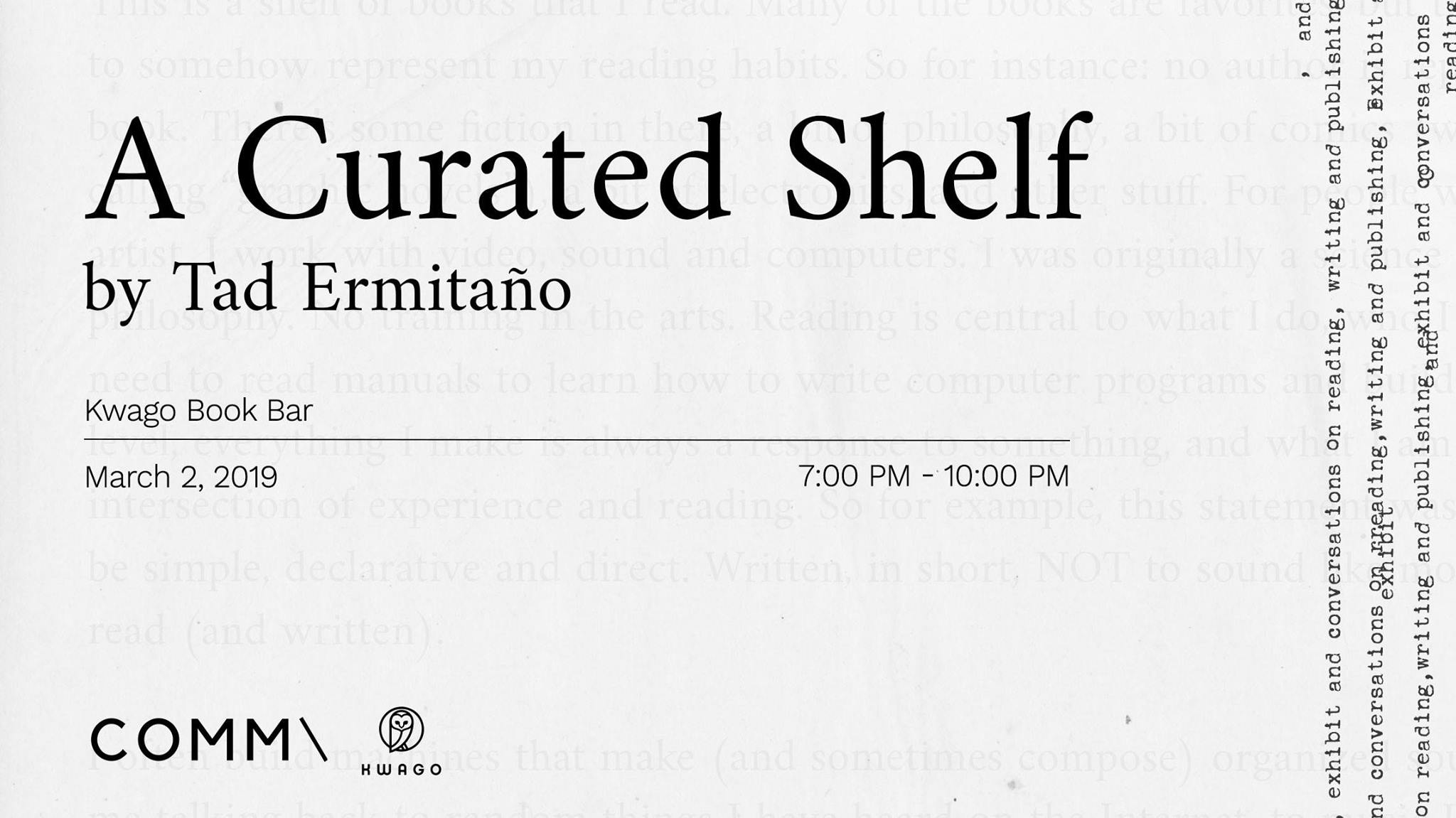A Curated Shelf Conversations: Tad Ermitaño

Saturday, March 2, 2019 at 7 PM – 10 PM
Kwago
Warehouse 8-A, La fuerza plaza, 2241 Chino Roces Ave., 1231 Makati
Kwago book bar just relaunched on February 9 with a renewed space, inventory and a special program: A Curated Shelf.
A collaboration between Comma and Kwago, A Curated Shelf is a platform for critical and playful conversations about publications and publishing as a discursive practice. A Curated Shelf wishes to address a wide range of questions on the relevance and scope of publishing.
To understand the many ways we read, write and publish, the program is a series of two-month exhibitions with corollary events that respond to the selection. For the first A Curated Shelf, we invited Tad Ermitano to assemble and exhibit fifteen publications that have influenced his life and practice.
Ermitaño is an artist who works across different fields: film & video, sound, programming and technology. For his shelf, he has selected novels, comics, and books on philosophy, music, programming and electronics that speculate on future possiblities.
On March 2, Ermitaño will give a talk about why reading forms an integral part of his artistic practice and who he has become as an individual, while on March 23, 5 individuals respond to his shelf.
The event is free but you need to register here to RSVP: http://bit.ly/rsvpacuratedshelf
Walk-ins pay 200 at the door.
SPREAD THE WORD: http://bit.ly/aconversationwithtad
======================
Books on the shelf:
- A Year with Swollen Appendices – Brian Eno
2. Dhalgren – Samuel Delany
3. Maggie the Mechanic – Jaime Hernandez
4. Nova Express – William S. Burroughs
5. Basketball Diaries – Jim Carroll
6. Philosophical Investigations – Ludwig Wittgenstein
7. The Three Stigmata of Palmer Eldritch – Philip K. Dick
8. The Dispossessed – Ursula K. Le Guin
9. Processing: A Programming Handbook for Visual Designers and Artists – Casey Reas & Ben Fry
10. Timer, Op Amp & Optoelectronic Circuits & Projects – Forrest M. Mims III
11. Electronic Projects for Musicians – Craig Anderton
12. A House in Bali – Colin McPhee
13. The Cyberiad – Stanislaw Lem
14. How Buildings Learn: What Happens After They’re Built – Stewart Brand
15. The Sinful Ones – Fritz Leiber
Tad’s Notes on the selection:
“This is a shelf of books that I read. Many of the books are favorites, but the group of them were selected to somehow represent my reading habits. So for instance: no author is represented by more than one book. There’s some fiction in there, a bit of philosophy, a bit of comics (which I am old enough to dislike calling “graphic novels”), a bit of electronics, and other stuff. For people who don’t know, I’m a media artist. I work with video, sound and computers. I was originally a science major, and then switched to philosophy. No training in the arts. Reading is central to what I do, who I am. On the most basic level, I need to read manuals to learn how to write computer programs and build circuits. On perhaps the next level, everything I make is always a response to something, and what I am responding to is often some intersection of experience and reading. So for example, this statement was written in a deliberate effort to be simple, declarative and direct. Written, in short, NOT to sound like most curatorial statements I have read (and written).
I often build machines that make (and sometimes compose) organized sound. These machines are often me talking back to random things I have heard on the Internet, to music I used to listen to, to peoples’ descriptions of what music is, and what music is supposed to do. I spend a lot of time thinking about and talking back to José Maceda, a Filipino composer who composed large, atonal works for gongs and bamboo instruments. At the same time, I grew up listening to rock music, and I refer a lot to the writings of Brian Eno (a self-described “non-musician” who started out as a synthesizer player for the rock band Roxy Music and went on to become a record producer and the inventor of ambient music) to help me clarify what ideas and assumptions I hold as a child of electric music, and how they differ from the assumptions held by people who grew up in a world of acoustic music.
Brian Eno’s diary is on this shelf, though there is nothing by Maceda, whose writings (I have to say) are not an easy read. There’s a lot of science fiction, and nothing remotely describable as “social realism”.
Actually, I prefer the phrase “speculative fiction” to “science fiction”, as speculating is what I like books to do, I think. To talk about what could be, rather than what is. What could be made. What could be the reason something is the way it is, and how it could be some other way. Speculation softens reality’s grip on us. It gives us the power to see the stone-solid present as a provisional, possibly even accidental collection of details that could just as easily be something else.”
Invite
https://www.facebook.com/events/1012446482280255/
